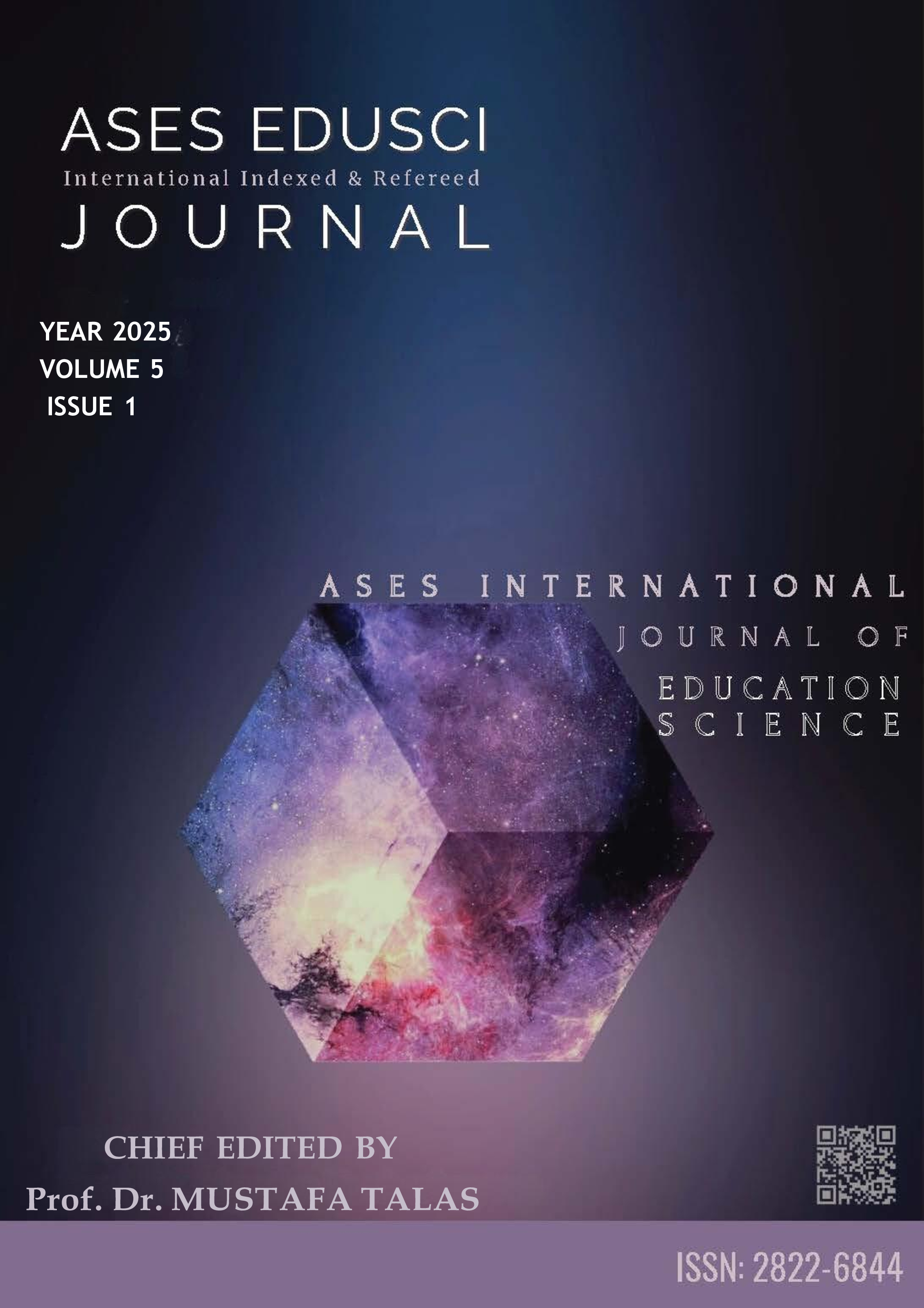Yapay Zeka ve Gelecek: Psikoloji Öğrencilerinin Perspektifinden Fenomenolojik Bir İnceleme
DOI:
https://doi.org/10.5281/zenodo.17255117Anahtar Kelimeler:
yapay zekâ, psikolojik danışma, fenomenolojik araştırmaÖzet
Bu araştırmada, psikoloji öğrencilerinin yapay zekâya ilişkin algıları, deneyimleri ve geleceğe yönelik beklentileri fenomenolojik bir yaklaşımla incelenmiştir. Teknolojik gelişmeler, özellikle yapay zekânın yükselişi, psikoloji alanında hem fırsatlar hem de belirsizlikler yaratmaktadır. Araştırma, Türkiye’de bir üniversitenin rehberlik ve psikolojik danışmanlık programında öğrenim gören 13 öğrenciyle gerçekleştirilmiştir. Yarı yapılandırılmış görüşmelerden elde edilen veriler, yorumlayıcı fenomenolojik analiz yöntemiyle değerlendirilmiştir. Bulgular, beş ana tema altında toplanmıştır: (1) mesleki perspektiften yapay zekâ kullanımı ve katkıları, (2) psikolojik danışma ve terapide yapay zekâ desteği, (3) danışan–danışman ilişkisine etkileri, (4) mesleki kaygılar ve (5) mesleki gelişim fırsatları. Öğrenciler, yapay zekânın veri analizi, test uygulamaları ve seans hazırlığında önemli kolaylıklar sağladığını belirtirken; empati eksikliği, güvenin zedelenmesi ve danışan–danışman ilişkisinde kopukluk gibi risklere de dikkat çekmiştir. Sonuç olarak, yapay zekânın psikolojik danışmada destekleyici bir araç olarak önemli katkılar sunabileceği, ancak insan merkezli yaklaşımla kıyaslandığında bazı kaygılar barındırdığı ortaya çıkmıştır. Çalışma, psikolojik danışmanlık eğitim programlarına yapay zekâ okuryazarlığı ve etik kullanım odaklı içerikler eklenmesi gerektiğini önermektedir.
Referanslar
Alfano, L., Malcotti, I., & Ciliberti, R. (2024). Psychotherapy, artificial intelligence and adolescents: ethical aspects. Journal of preventive medicine and hygiene, 64(4), E438–E442. https://doi.org/10.15167/2421-4248/jpmh2023.64.4.3135
Ali, Y., Zhong, B., Jiang, M., & Qu, W. (2025). Emerging AI individualism: How young people integrate social AI into everyday life. Communication and Change, 1(1), Article 11. https://doi.org/10.1007/s44382-025-00011-2
Ankomah, A., & Turkson, E. (2025). Emotion-aware AI chatbots for mental health support in low-resource public health systems: A case study from Ghana. World Journal of Public Health, 10(3), 17–29. https://www.sciencepublishinggroup.com/article/10.11648/j.wjph.20251003.17
Bogdan, R. C., & Biklen, S. K. (2003). Qualitative research for education (4th ed.). Allyn & Bacon.
Chatterjee, S., Chaudhuri, R., Vrontis, D., & Giovando, G. (2023). Digital workplace and organization performance: Moderating role of digital leadership capability. Journal of Innovation & Knowledge, 8(1), 100334.
Cross, S., Bell, I., Nicholas, J., Valentine, L., Mangelsdorf, S., Baker, S., ... & Alvarez-Jimenez, M. (2024). Use of AI in mental health care: Community and mental health professionals survey. JMIR Mental Health, 11(1), e60589.
Fiske, S. T. (2018). Social beings: Core motives in social psychology. John Wiley & Sons.
Islam, M. A., Ithmam, S. R., & Islam, M. T. (2023). The impact of artificial intelligence on daily life and the workplace: A qualitative statistical survey in Bangladesh. International Journal of Science and Business (IJSAB), 29(1), 63–76. https://ijsab.com/volume-29-issue-1/6345
Javaid, M., Haleem, A., & Singh, S. (2022). Artificial Intelligence Applications for Industry 4.0. In Handbook of Industry 4.0 and Smart Systems. World Scientific. https://doi.org/10.1142/S2424862221300040
Lari, H. A., & K. S., M. (2024). AI in Consulting Services : Applications, Challenges, and Ethical Insights. Indian Journal of Computer Science, 9(6), 34–53. https://doi.org/10.17010/ijcs/2024/v9/i6/174711
Mertens, D. M. (2010). Research and evaluation in education and psychology: Integrating diversity with quantitative, qualitative, and mixed methods (3th ed.). Sage publications.
Olawade, D. B., Wada, O. Z., Odetayo, A., David-Olawade, A. C., Asaolu, F. and Eberhardt, J. 2024. Enhancing mental health with Artificial Intelligence: Current trends and future prospects. Journal of Medicine, Surgery, and Public Health. 3 (Art. 100099). https://doi.org/10.1016/j.glmedi.2024.100099
Patton, M. Q. (2002). Qualitative research & evaluation methods (3rd ed.). Thousand Oaks, CA: Sage Publications.
Pietkiewicz, I., & Smith, J. A. (2014). A practical guide to using interpretative phenomenological analysis in qualitative research psychology. Psychological journal, 20(1), 7-14. DOI: 10.14691/CPPJ.20.1.7
Plathottam, S. J., Rzonca, A., & Lakhnori, R. (2023). A review of artificial intelligence applications in manufacturing operations. Journal of Advanced Manufacturing and Processing, 5, e10159. https://doi.org/10.1002/amp2.10159
Smith, J. D., Flowers, P. ve Larkin, M. (2009), Interpretative phenomenological analysis: Theory, Method and Research. London: SAGE Publications.
Spytska, A. (2025). The use of artificial intelligence in psychotherapy: Development of intelligent therapeutic systems. BMC Psychology, 13, Article 91. https://bmcpsychology.biomedcentral.com/articles/10.1186/s40359-025-02491-9
Wang, S., Xu, X., & Ouyang, F. (2024). Artificial intelligence in education: A systematic literature review. Journal of Educational Computing Research. https://doi.org/10.1016/j.jedcom.2024.101033
Zisquit, F., Shoa, R., Oliva, J., Perry, S., Spanlang, B., Klomek, A., Slater, M., & Friedman, H. (2025). AI-enhanced virtual reality self-talk for psychological counseling: Formative qualitative study. JMIR Mental Health, 12(1), e40173. https://pubmed.ncbi.nlm.nih.gov/40173447
İndir
Yayınlanmış
Nasıl Atıf Yapılır
Sayı
Bölüm
Lisans
Telif Hakkı (c) 2025 ASES EDUSCI (INTERNATIONAL JOURNAL OF EDUCATIONAL SCIENCES) ISSN: 2822-6844

Bu çalışma Creative Commons Attribution-NonCommercial 4.0 International License ile lisanslanmıştır.


